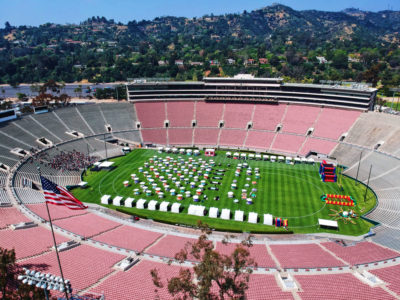Discovering the Rich Heritage of the Pasadena Rose Bowl

Few spectacles rival the Rose Bowl in the realm of American athletics. Recognized as the “Granddaddy of Them All,” this symbolic collegiate football event has woven into the tapestry of sports history. Learn about its modest beginnings to its esteemed status as an emblem of athletic prowess.
Origins:
The Rose Bowl’s genesis dates back to the early 20th century, when Pasadena, California, sought to showcase its delightful winter climate. In 1890, the Valley Hunt Club organized the inaugural Tournament of Roses, featuring a parade adorned with exquisite floral displays. This success inspired the inclusion of a football contest to attract more visitors.
The Inception of a Tradition:
On January 1, 1902, the first Rose Bowl Game unfolded at Tournament Park in Pasadena. The inaugural match saw the University of Michigan face Stanford University, resulting in Michigan’s resounding triumph with a score of 49-0. Despite the one-sided outcome, the event laid the groundwork for future iterations of the competition.
Transition to the Rose Bowl Stadium:
In 1923, the Rose Bowl found its permanent home with the completion of the stadium. This majestic venue, with its iconic horseshoe layout and breathtaking backdrop of the San Gabriel Mountains, provided an idyllic setting for the annual gridiron clash. Since then, the stadium has become synonymous with the Rose Bowl, witnessing numerous unforgettable moments.

Growing Influence:
As collegiate football’s popularity soared, so did the prominence of the Rose Bowl. In 1947, the game made its nationwide television debut, captivating millions of viewers with its exhilarating action. This exposure propelled the Rose Bowl to its status as one of the premier events in American sports.
Time-Honored Traditions:
Beyond athletics, the Rose Bowl is renowned for its enduring traditions and extravagant pageantry. Transitioning from the realm of sports to cultural celebration, the Tournament of Roses Parade precedes the game, showcasing intricately crafted floats, marching bands, and equestrian ensembles. Furthermore, these festivities contribute significantly to the enchantment of the Rose Bowl experience, creating lasting memories for participants and spectators alike.
Legendary Moments:
Throughout its illustrious history, the Rose Bowl has witnessed an array of iconic moments. From stellar performances by Heisman Trophy recipients to thrilling come-from-behind victories, the game has delivered suspense and excitement. Whether it’s the “Granddaddy of Them All” or a pivotal matchup in the College Football Playoff era, the Rose Bowl continues to serve up unforgettable moments.
Legacy and Influence:
Beyond its role as a sporting spectacle, the Rose Bowl holds a special place in the cultural landscape of America. Transitioning beyond athletics, it symbolizes tradition, excellence, and community, thereby uniting individuals from all walks of life in celebration of competition and camaraderie. Furthermore, from its modest origins to its current global stature, the Rose Bowl stands as a testament to sport’s enduring power to unify and inspire.
The Rose Bowl’s illustrious history reflects its distinct place in American sports. Evolving from humble beginnings to a cultural cornerstone, it has captivated fans across generations. As we eagerly anticipate each new game, we continue to witness its timeless significance.





As USC football fans we spent many New Year’s Day’s at the Rose Bowl when I was a kid. And then I took my kids when they were older too. Very fond memories for me.